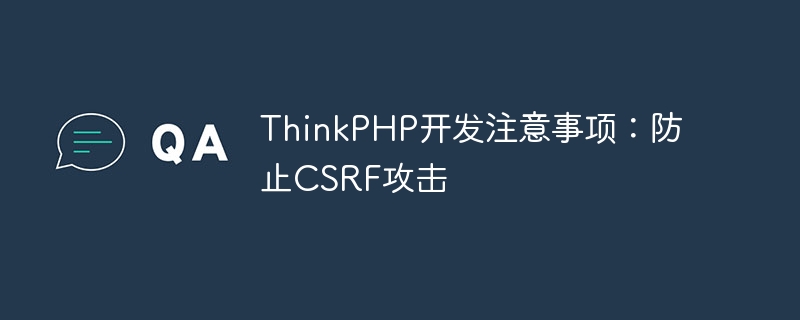

ThinkPHP is a very popular PHP development framework, which is widely used in various projects. However, as network security issues become increasingly prominent, developers must pay special attention to preventing various potential security threats when developing using frameworks, including CRSF (Cross-site request forgery) attacks. CRSF attack is an attack method that uses users to send requests while they are logged in to other websites. It may cause user accounts to be stolen and even cause certain economic losses. This article is to discuss how to prevent CRSF attacks when using ThinkPHP for development.
In ThinkPHP, Token verification can be used to prevent CRSF attacks. Specifically, by adding a hidden Token field to the form and verifying the validity of the Token in the background, we ensure that the form submission is legal.
In the controller, you can generate the Token and pass it to the template as follows:
$token = md5(uniqid(rand(), true));
$this->assign('token', $token);In the template, you can add the Token to the form and verify the Token when the form is submitted. :
<form action="/submit" method="post">
<input type="hidden" name="__token__" value="{$token}">
<!-- 其他表单字段 -->
</form>In the method of processing form submission, you can use the following code to verify the validity of the Token:
if(!Request::token('__token__', 'post')){
// Token验证失败
}Through the above method, you can effectively prevent the harm caused by CRSF attacks to form submission. .
In ThinkPHP, you can enable strict mode through the configuration file to enhance protection against CRSF attacks. In the config configuration file, you can set 'url_common_param_restrict' => true, which will force all requests to carry the Token parameter to prevent unauthorized requests from entering the system.
In addition, you can also set 'request_cache' => false, which can disable request caching and avoid potential CRSF attacks.
As Web security issues become increasingly serious, the ThinkPHP team will continue to release new versions to fix various security vulnerabilities. Therefore, when developers use the ThinkPHP framework for development, they must keep an eye on the framework version and update to the latest version in a timely manner to ensure that their systems are not affected by known vulnerabilities.
When receiving and processing user input, be sure to strictly filter and verify the input to avoid any potential security risks. You can use the input filtering functions provided by ThinkPHP, such as the input() function, to strictly verify and process user input.
Follow the Internet security community and ThinkPHP official announcements to learn about the latest security vulnerability information. Keeping abreast of the existence of security vulnerabilities can help developers take timely measures to protect the security of the system.
In short, preventing CRSF attacks requires developers to maintain a high degree of vigilance and a rigorous attitude when developing using ThinkPHP. In addition to the points mentioned above, it is more important to maintain continuous attention and learning about Web security issues, and constantly improve one's own security awareness and skills to ensure that the security of the developed system is more controllable. status. Only in this way can the security of user data and systems be better protected during the actual development process.
The above is the detailed content of ThinkPHP development notes: Preventing CSRF attacks. For more information, please follow other related articles on the PHP Chinese website!
 Which one is easier, thinkphp or laravel?
Which one is easier, thinkphp or laravel?
 How is the performance of thinkphp?
How is the performance of thinkphp?
 Introduction to software development tools
Introduction to software development tools
 How to implement CSS carousel function
How to implement CSS carousel function
 hiberfil file deletion method
hiberfil file deletion method
 What does activity mean?
What does activity mean?
 Yiou Exchange app official website download address
Yiou Exchange app official website download address
 Login token is invalid
Login token is invalid
 How to open ai format in windows
How to open ai format in windows